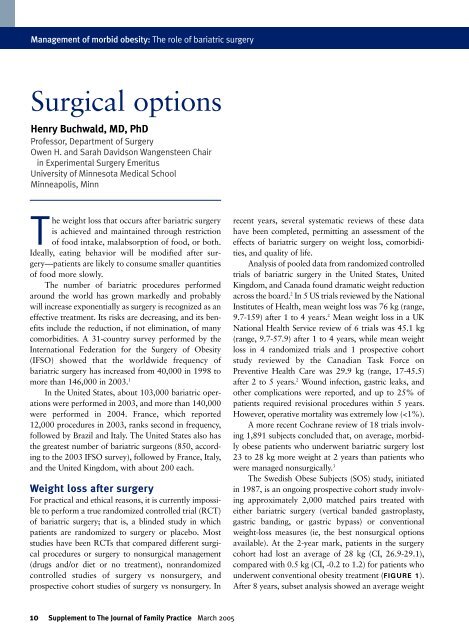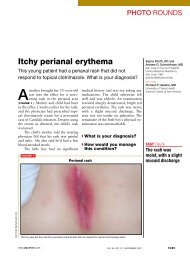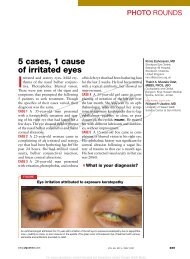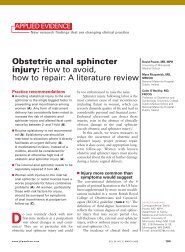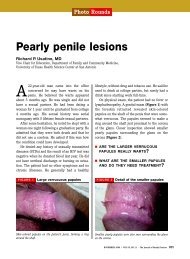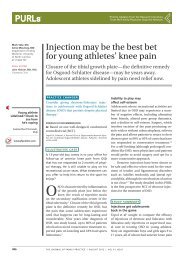Management of morbid obesity - The Journal of Family Practice
Management of morbid obesity - The Journal of Family Practice
Management of morbid obesity - The Journal of Family Practice
You also want an ePaper? Increase the reach of your titles
YUMPU automatically turns print PDFs into web optimized ePapers that Google loves.
<strong>Management</strong> <strong>of</strong> <strong>morbid</strong> <strong>obesity</strong>: <strong>The</strong> role <strong>of</strong> bariatric surgery<br />
Surgical options<br />
Henry Buchwald, MD, PhD<br />
Pr<strong>of</strong>essor, Department <strong>of</strong> Surgery<br />
Owen H. and Sarah Davidson Wangensteen Chair<br />
in Experimental Surgery Emeritus<br />
University <strong>of</strong> Minnesota Medical School<br />
Minneapolis, Minn<br />
<strong>The</strong> weight loss that occurs after bariatric surgery<br />
is achieved and maintained through restriction<br />
<strong>of</strong> food intake, malabsorption <strong>of</strong> food, or both.<br />
Ideally, eating behavior will be modified after surgery—patients<br />
are likely to consume smaller quantities<br />
<strong>of</strong> food more slowly.<br />
<strong>The</strong> number <strong>of</strong> bariatric procedures performed<br />
around the world has grown markedly and probably<br />
will increase exponentially as surgery is recognized as an<br />
effective treatment. Its risks are decreasing, and its benefits<br />
include the reduction, if not elimination, <strong>of</strong> many<br />
co<strong>morbid</strong>ities. A 31-country survey performed by the<br />
International Federation for the Surgery <strong>of</strong> Obesity<br />
(IFSO) showed that the worldwide frequency <strong>of</strong><br />
bariatric surgery has increased from 40,000 in 1998 to<br />
more than 146,000 in 2003. 1<br />
In the United States, about 103,000 bariatric operations<br />
were performed in 2003, and more than 140,000<br />
were performed in 2004. France, which reported<br />
12,000 procedures in 2003, ranks second in frequency,<br />
followed by Brazil and Italy. <strong>The</strong> United States also has<br />
the greatest number <strong>of</strong> bariatric surgeons (850, according<br />
to the 2003 IFSO survey), followed by France, Italy,<br />
and the United Kingdom, with about 200 each.<br />
Weight loss after surgery<br />
For practical and ethical reasons, it is currently impossible<br />
to perform a true randomized controlled trial (RCT)<br />
<strong>of</strong> bariatric surgery; that is, a blinded study in which<br />
patients are randomized to surgery or placebo. Most<br />
studies have been RCTs that compared different surgical<br />
procedures or surgery to nonsurgical management<br />
(drugs and/or diet or no treatment), nonrandomized<br />
controlled studies <strong>of</strong> surgery vs nonsurgery, and<br />
prospective cohort studies <strong>of</strong> surgery vs nonsurgery. In<br />
10 Supplement to <strong>The</strong> <strong>Journal</strong> <strong>of</strong> <strong>Family</strong> <strong>Practice</strong> March 2005<br />
recent years, several systematic reviews <strong>of</strong> these data<br />
have been completed, permitting an assessment <strong>of</strong> the<br />
effects <strong>of</strong> bariatric surgery on weight loss, co<strong>morbid</strong>ities,<br />
and quality <strong>of</strong> life.<br />
Analysis <strong>of</strong> pooled data from randomized controlled<br />
trials <strong>of</strong> bariatric surgery in the United States, United<br />
Kingdom, and Canada found dramatic weight reduction<br />
across the board. 2 In 5 US trials reviewed by the National<br />
Institutes <strong>of</strong> Health, mean weight loss was 76 kg (range,<br />
9.7-159) after 1 to 4 years. 2 Mean weight loss in a UK<br />
National Health Service review <strong>of</strong> 6 trials was 45.1 kg<br />
(range, 9.7-57.9) after 1 to 4 years, while mean weight<br />
loss in 4 randomized trials and 1 prospective cohort<br />
study reviewed by the Canadian Task Force on<br />
Preventive Health Care was 29.9 kg (range, 17-45.5)<br />
after 2 to 5 years. 2 Wound infection, gastric leaks, and<br />
other complications were reported, and up to 25% <strong>of</strong><br />
patients required revisional procedures within 5 years.<br />
However, operative mortality was extremely low (


